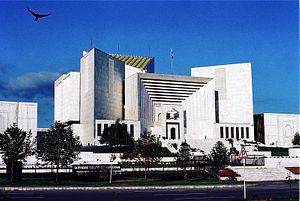Last week, an Islamabad High Court judge, Justice Shaukat Aziz Siddiqui, leveled serious allegations against the country’s security establishment for manipulating the ongoing electoral process, days before the July 25 general elections.
Justice Siddiqui alleged that efforts are being made to isolate some political groups in the country, while others are being offered an open electoral field. In response, the military’s spokesperson requested the Supreme Court of Pakistan to “initiate appropriate process to ascertain the veracity of the allegations” made by Justice Siddiqui of the Islamabad High Court.
Justice Siddiqui’s allegations have raised serious questions about the credibility of the ongoing election campaign in the country. While replying to the Inter-Services Public Relation’s request, Justice Siddiqui, in a letter written directly to the Chief Justice of Pakistan, questioned whether the court was willing to take action if his claims were established. If one is to assume that the country’s courts are under pressure to decide on cases that by and large have political grounds, then the results of the election are already out.
While Pakistan may see a fractured and polarized coalition at the federal level after July 25, the country’s judiciary will only be remembered as a party to the ongoing rigging process rather than an institution that upheld the sanctity of the constitution.
Last Saturday, a court sentenced a national assembly candidate of the Pakistan Muslim League-Nawaz to life in prison just a week before election day. It’s striking that court convened to offer its verdict late at night, and that too outside of work days. In another development, a senior political official who has been accused of target killings in Karachi and elsewhere was let go by a court irrespective of the fact that substantial evidence exists in the case against him.
Over the course of last two weeks, a number of reports and video recordings have emerged showing that officials of some government departments have been attempting to force candidates of various political parties into changing their political loyalties. In this regard, a number of candidates have publicly claimed that officials from several security establishment-linked organizations have been threatening them with dire consequences if they don’t give up their support for parties that are critical of the judiciary and the security establishment.
It should not come as a surprise that the judiciary then, as an institution in Pakistan, has always assisted non-democratic forces that have not only undermined the legitimacy of their own institution but also the legitimacy of the country’s constitution itself. Throughout the country’s history, whenever efforts were made to ensure that elections in the country do not go through a fair and transparent process, the judiciary has always found itself on the wrong side of history.
Previously, a former prime minister of Pakistan was given a death sentence by the country’s courts for mainly his efforts to ensure the supremacy of civilian leadership in Pakistan. It’s quite telling that not a single prime minister in Pakistan’s history has been allowed to complete his five-year term in office. On the other hand, extremist groups in Pakistan continue to kill, abuse, and terrorize the country but the Supreme Court has never asked the security apparatus for its assistance to take on these elements in the country. Last year, an extremist group held the country’s capital hostage for weeks and Pakistan’s top court not only refused to intervene, but also issued a show cause notice to a judge of a lower court that questioned the apathy of the Supreme court towards the incident.
While millions of cases remain pending in courts, the chief justice of Pakistan has declared that his only mission in life is to build dams and clear Pakistan’s foreign debt. The chief of the Supreme Court doesn’t appear to be concerned about the state of his own institution which is stained with corruption, unprofessionalism, and is often seen as supporting radical forces in the country.
On July 25, Pakistani voters will find themselves not only going against forces that have over the course of seventy years disrupted elected civilian efforts to build Pakistan on the right path, but also against the judicial malpractice in the country.

































